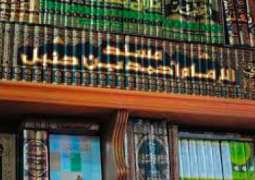
This nullifies the ablution regardless of whether it was owing to insanity, fainting, drunkenness, or some medicine. It also does not matter if one was unconscious for a short or long period of time, or if one was sitting, or fell to the earth, and so on.
The aspect of unawareness here is greater than that of sleeping. The scholars are agreed on this point.
Touching the sexual organ without any “barrier” between the hand and the organ
Busrah bint Safwan narrated that the Prophet, upon whom be peace, said, “Whoever touches his sexual organ cannot pray until he performs ablution.”
This hadith is related by “the five.” At-Tirmizhi classified it as sahih and al-Bukhari called it the most authentic report on that topic. Malik, ash-Shaifi, Ahmad and others also narrated it. Abu Dawud said, “I asked Ahmad, ‘Is the hadith of Busrah authentic?’ He said, ‘Certainly it is authentic.” In the narration of Ahmad and an-Nasa’i, Busrah heard the Prophet saying, “Ablution is to be made by the one who touches his sexual organ.” This is general and encompasses touching one’s own sexual organs or touching somebody else’s. Abu Hurairah reported the Prophet as saying, “Whoever touches his sexual organ without any covering (between them) must perform ablution.” (Related by Ahmad, Ibn Hibban and al-Hakim, who classified it as sahih, as did Ibn ‘Abdul-Barr.)
Said Ibn as-Sakin, “That hadith is from the best of what has been related on this topic.” Ash-Shaf’i related: “Any man who touches his penis must perform ablution. Any women who touches her vagina must perform ablution.” Commenting on its authenticity, Ibn al-Qayyim quotes al-Hazimi who says, “That chain is sahih.” The Hanifiyyah are of the opinion, based on the following hadith, that touching the sexual organ does not nullify the ablution: “A man asked the Prophet if a man who touches his penis has to perform ablution. Said the Prophet, upon whom be peace, “No, it is just a part of you.” (Related by “the five.” Ibn Hibban classified it as sahih, and Ibn al-Madini said, “It is better than the hadith of Busrah.’’)
Touching a woman
‘Aishah related that the Messenger of Allah, upon whom be peace, kissed her while he was fasting and said, “Kissing does not nullify the ablution, nor does it break the fast.” (Related by Ishaq ibn Rahawaih and al-Bazzar with a good chain.)
Evaluating its authenticity, ‘Abdul-Haqq says, “I do not know of any defect in the hadith that could cause its rejection.”
‘Aishah also said, “One night, I missed the Messenger of Allah in my bed, and so went to look for him. I put my hand on the bottom of his feet while he was praying and saying, ‘O Allah, I seek refuge in Your pleasure from Your anger, in Your forgiveness from Your punishment, in You from You. I cannot praise you as You have praised Yourself” (related by Muslim and at-Tirmizhi, who classified it as sahih.), and she also reported, ‘The Prophet kissed some of his wives and went to prayer, without performing ablution.” (Related by Ahmad and “the four,’’ and its narrators are trustworthy.) She also said, “I would sleep in front of the Prophet, upon whom be peace, with my feet in the direction of the qiblah (to him). When he made prostrations, he would touch me, and I would move my feet.” In another narration it says, “When he wanted to prostrate, he would touch my legs.”
Bleeding from an unusual place
This involves bleeding due to a wound, cupping or a nosebleed, and regardless of whether the amount of blood is small or large.
Said al-Hassan, “The Muslims still prayed even while wounded.” (Related by al-Bukhari.) He also reported, “Ibn ‘Umar squeezed a pimple until it bled, but he did not renew his ablution. Ibn Abi ‘Uqiyy spat blood and continued his prayer. ‘Umar ibn al-Khattab prayed while blood was flowing from him. ‘Ibbad ibn Bishr was hit with an arrow while praying, but continued his prayers.” (Related by Abu Dawud, Ibn Khuzaimah, and al-Bukhari in Mu ‘Allaq form.)
Vomit
Regardless of whether the amount of vomit was great or small, there is no sound hadith that it nullifies ablution.
Eating camel meat
That this does not nullify the ablution was the opinion of the four rightly guided caliphs, the companions and the following generation, although there is an authentic hadith that states one should make ablution after it.
Said Jabir ibn Sumrah, “A man asked the Prophet, ‘Should we make ablution after eating mutton?’ He said, ‘If you wish, make ablution. If you do not, do not make ablution.’ The man asked ‘Should we make ablution after eating camel meat?’ He said, ‘Yes.”’ Al-Barra’ ibn ‘Aazib related that someone asked the Prophet about praying in the dens of camels, and he said, “Do not pray therein, for they are of the devils.” He asked about the dens of sheep, and he said, “Pray therein, for they are blessings. (Related by Ahmad, Abu Dawud and Ibn Hibban.) Ibn Khuzaimah said, “I know of no dispute over the authenticity of this report.” In summation, an-Nawawi can be quoted as saying, “This opinion has the strongest proof, although the majority of the scholars differ from it.”
Of doubts whether or not one has released gas
This is the case where the person cannot quite recall if he is in a state of purity or not. Such a state of mind does not nullify ablution, regardless of whether the person is in prayer or not, until he is certain that he has nullified his ablution. ‘Abbad ibn Tameem related that his uncle queried the Prophet about a person who feels something in his abdomen while praying. Said the Prophet, “He should not leave (the prayer) until he hears it or smells it.” (Related by Muslim, Abu Dawud and at-Tirmizhi). It does not mean that its sound or bad smell nullifies ablution, but that the person must be certain about the fact that he has nullified his ablution. Says Ibn al-Mubarak, “If one is uncertain about his condition of purity, he does not need to perform a new ablution.” If one is certain that he has nullified his ablution and doubts whether he has purified himself or not, he must perform a new ablution.
To be continued


